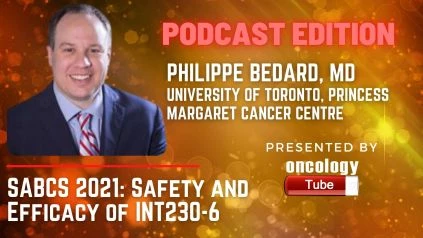Philippe Bedard, MD is an Associate Professor of Medicine at the University of Toronto. He is a Staff Medical Oncologist in the Division of Medical Oncology and the Fellowship Director for the Bras Drug Development Program at the Princess Margaret Cancer Centre in Toronto. In this video, he speaks about the SABCS 2021 Abstract – Safety and Efficacy of INT230-6, a Potential First-in-Class Intratumoral Therapy, in Monotherapy and in Combination with Pembrolizumab: Results from the IT-01 Study KEYNOTE-A10] in Subjects with Locally Advanced, Unresectable and Metastatic Breast Cancer.
Â
Â
Description in detail:
Â
INT230-6 is a fixed-ratio combination of three agents: a cell permeability enhancer and two strong anti-cancer payloads (cisplatin and vinblastine sulfate). The penetration enhancer promotes the dispersion of the two medicines across injected tumors and allows for more diffusion into cancer cells. (There were no findings in nonclinical safety investigations after drug injection into healthy tissues.)
Â
INT230-two 6’s active medicines have traditionally been administered intravenously (IV) to achieve a systemic blood level at the limit of acceptability. The goal is to eliminate both visible tumors and invisible circulating cancer cells (micro-metastases). Unfortunately, administering medications intravenously only delivers a limited amount with a poor concentration at the tumor location. This method, particularly for late-stage malignancies, is ineffective and frequently hazardous to the patient.
Â
Attempts to treat the injected tumor, non-injected tumors, or micro-metastases with direct intratumoral injection of chemotherapeutic drugs have failed. This lack of efficacy for local administration could be attributed to inadequate agent dispersion and a lack of cell absorption.
Â
Because of the introduction of the novel cell penetration boosting chemical INT230-6, the treatment is highly effective in animals with big tumors. According to the Sponsor’s in vivo, non-clinical research, INT230-6 completely saturates and kills implanted tumors. Furthermore, the medication triggers an adaptive (T-cell mediated) immune response that targets not only the injected tumor but also non-injected tumors and undetected micro-metastases. Animals who have been cured become permanently vaccinated against the type of cancer that INT230-6 destroys.
Â
The purpose of clinical study IT-01 is to assess the safety and potential efficacy of directly injecting INT230-6 into numerous different types of tumors. Furthermore, animal investigations revealed that INT230-6 has a substantial synergy with immune modulation drugs. As part of trial IT-01, the Sponsor hopes to learn more about the safety and efficacy of INT230-6 when combined with immuno-therapeutic drugs such as antibodies targeting Programmed Cell Death (PD-1 or anti-PD-1) and Cytotoxic T-Lymphocyte Associated Protein 4 (CTLA-4 or anti-CTLA-4) receptors.
Â
This study aims to determine whether tumor regression is possible and whether patient outcomes can be improved.

